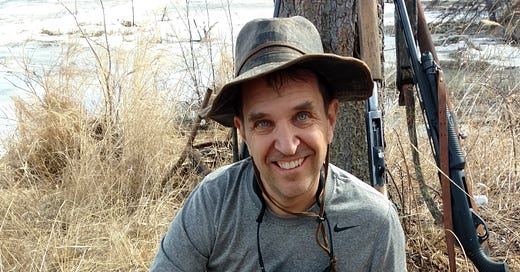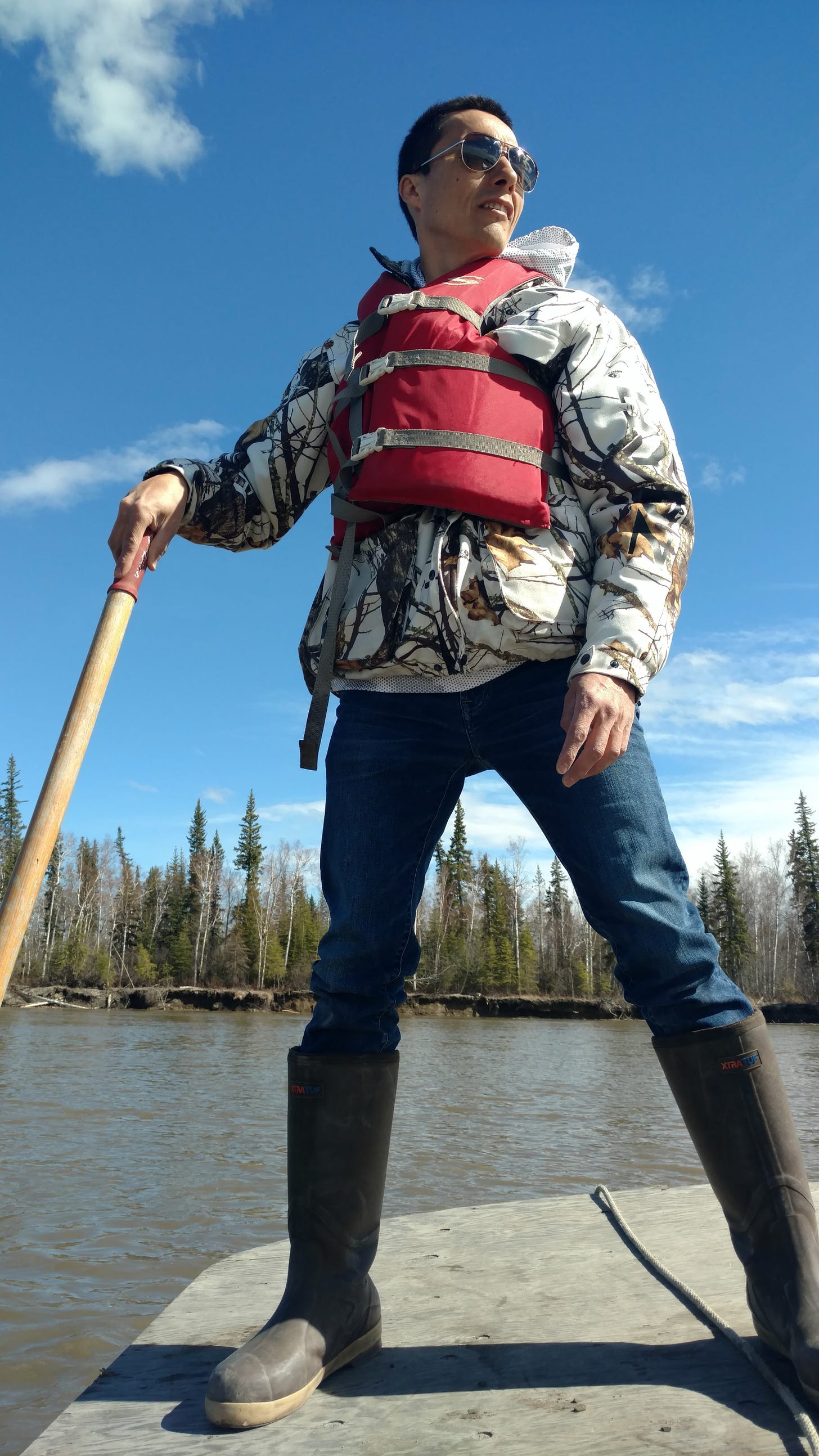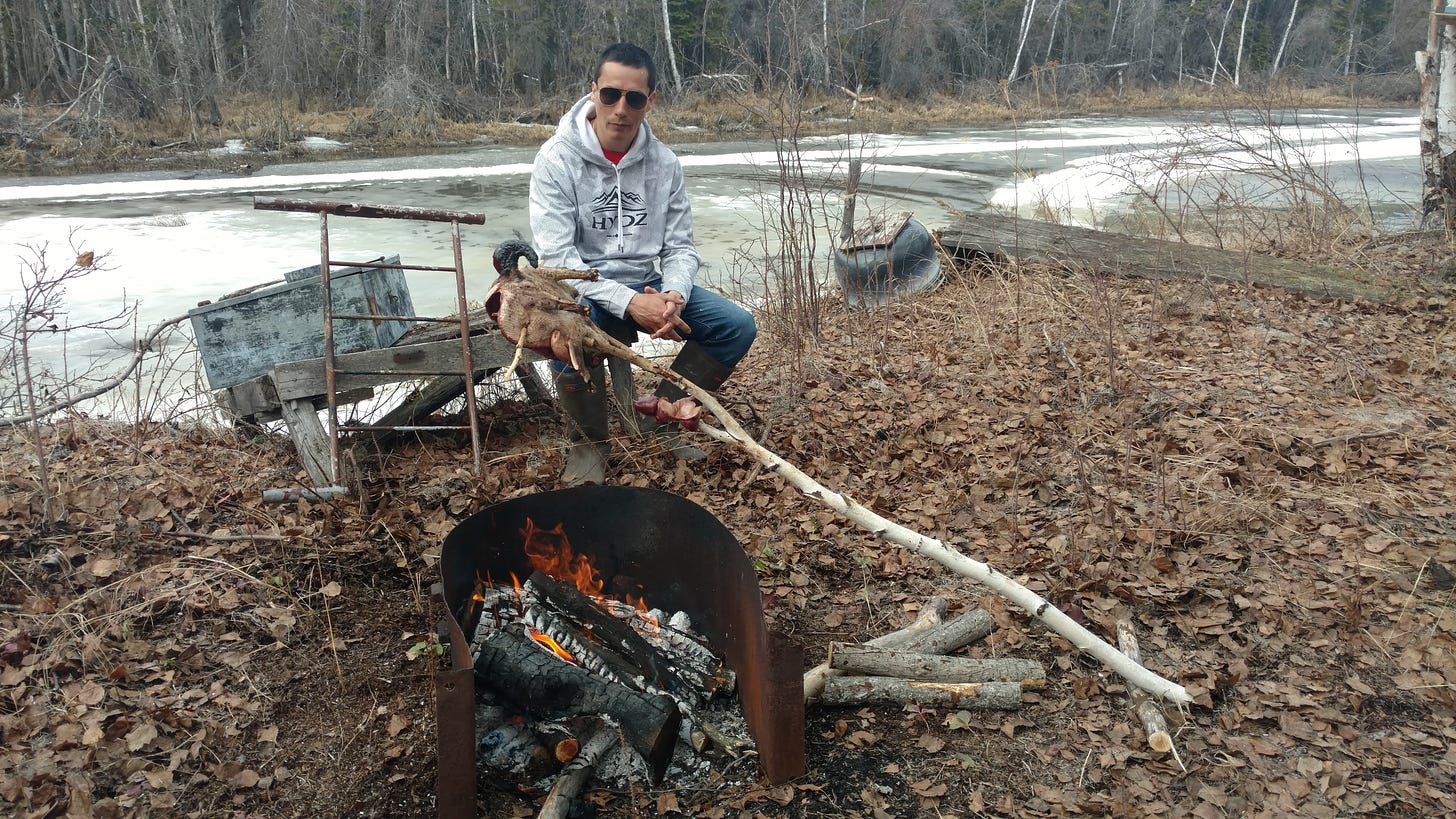A love letter to journalism, 30 years in the making
Or why eating goose that tastes like a Nerf football is a fulfilling way to live
Thank you for being a subscriber.
If you enjoy this newsletter, please consider recommending it to others and becoming a paid subscriber. You’ll get dispatches about travel, adventure and #dadlife that will sometimes be heartfelt and profound, sometimes peel back modern parenting life for a look inside, and sometimes be, well, whatever this is. If you support my work, I would appreciate it.
A love letter to journalism, 30 years in the making
I’ve told this story a million billion times. Now, on the 30th anniversary of my journalism career, I’m going to tell it again.
I started my first journalism job 30 years ago this week in my home state of Michigan at The (Adrian) Daily Telegram.
On my first full day at the paper, fire destroyed a home. I had lived in a crummy apartment across the street from the fire department for all of one day. Late that afternoon, I walked across the street to the fire department to ask the chief for details. He said, “I’m going over there right now, do you want to come with me?”
OF COURSE I WANT TO GO WITH YOU, I thought, and probably said, because I was even more excitable then than I am now, and that’s saying something.
It’s been three decades, but I can still smell the smoke. As we walked in through the back, there was a door on each side. He pointed to one, where the room was burnt to a crisp. He said that door was open when fire fighters arrived. He pointed to the other side, where the room appeared undamaged. He said that door was closed when they arrived.
Whether the door was open made all the difference.
I was beyond excited—my first day, and I had a story I would never forget.
I’ve never lost that thrill of finding stories. Not for one day.
Not even after 30 years.
I consider it a great blessing that I’ve (almost) never wanted to do anything else, and I’ve (almost) always had someone willing to pay me to do it. If all of work can be reduced to making widgets, I have enjoyed the making of my widgets more than most, and I’m grateful for that.
I love writing stories—from coming up with an idea to gathering the information to writing to revising … ha, no, I hate revising, but that’s OK, because I (usually) like having revised.
The times I’ve thought about leaving the business have always been about the business, never about the widgets. As a business, journalism has been a cartoonish nightmare since the dawn of the Internet. But this newsletter isn’t about what’s wrong with the journalism business model.
It’s about what’s right about being a journalist.
And I still love it after 30 years, for many reasons.
I’ll limit this to three.
1. Redemption of pain
The boy was 10 years old or so, and he lived in my coverage area near Easton, Pennsylvania. He had died of cancer, and a baseball field was dedicated to him.
I wrote a long story about the boy and his love of baseball, a piece for which I was way out over my skis.
This was 26 years ago. I was a young cocky punk, and my ambition far outpaced my skill. I cared only about breaking news. I wanted to work my way up to covering the White House and presidential campaigns, and the way to do that was not to write about boys who loved baseball and died of cancer. I didn’t care about such stories. I couldn’t relate to such pain and had no idea how to handle a story like that.
His parents told me they talked more about their son’s life and death with me than with anybody else, even each other. I have heard comments like that again and again in the time since.
It was years before I understood, and sometimes it still surprises me, how grateful people are to be asked to talk about the immense pain or struggles or whatever tragedies have befallen them.
I understand now what I didn’t then: They know that sharing their struggles might help someone else going through something similar. They might see the pain, feel seen, and feel less alone. Sharing the suffering gives the pain meaning, and it’s humbling, and a blessing, and an honor, to play a role in the sharing.
2. Real conversations with real people about real things
Many years ago, I interviewed for a job at a medium-sized paper that employed an incredible investigative team. They wrote stories even big papers only dreamed of. In describing one of the interviews in one of those stories, the news editor said of an expert’s interpretation of statistics, “we got him to say.”
That immediately rang hollow. The story was about police malfeasance, and “we got him to say” is NOT the same as “it is.” It was as if the editor was celebrating the cajoling or the trickery or the cleverness of the questions rather than whether the police had actually committed the malfeasance. The point was not whether the story was true but rather that someone said it was.
That bugged me for years, and I’m not even sure I could have explained the why like I just did … until I became a dad and started taking my daughter to the park and talking to other parents. We shared stories about sleeplessness and poop and sleeplessness and being pooped on and all the places we found Cheerios and did I mention poop and sleeplessness?
Those conversations at the park absolutely transformed the way I do interviews.
It dawned on me that everyone I ever wrote about was someone else’s kid.
Up to that point every interview I had ever done had been purely transactional. Without realizing it, I had operated under a “got him to say” ethos all my career. The subjects I interviewed told me something, I wrote about it, and that was it.
That meant I had thousands upon thousands of conversations all just to get a story out of it and move on. That’s a crummy way to live. If all I ever had to show for my career was an endless stream of stories in which I “got him to say,” that would be almost unbearably sad.
Now I see interviews as far more relational. Yes, I am still writing a story. Yes, we still need each other. But far more important, someone is telling me a story. I have the privilege to talk to them about the best and worst days of their lives. Sometimes they are the same days.
3. Making connections across a vast world
One of the most memorable days of my career was when I flew to Alaska to interview Ricko DeWilde (in the photo above), a star of the TV show Life Below Zero.
You can read the whole story here. The highlight is that we got up long before dawn, drove hours across the bleak landscape of Alaska, climbed into a rickety wooden boat, floated down an icy river, shot a goose, plucked it, cooked it over an open fire, and ate it.
After the story came out, he wrote me a nice note saying I had made a boring day seem exciting. I marveled at the kind of life he must have led that he would consider that day boring. That’s one of the most memorable reactions from a subject I’ve ever gotten and proved my final point: Journalism is a way to connect us to each other, to learn how we are the same, how we are different, and maybe, just maybe, find a path between those two.
Real talk: The goose tasted like a Nerf football. As food, it was worthless. As a life-expanding experience, it was priceless. I will never, and I mean never, ever, forget my ears exploding as he shot it, plucking it at the side of the river, or spitting out shotgun pellets as I ate it.
The best part of journalism is it enables me to spend hours and hours with someone whose life, experience and background could not be more different than mine. I can’t help but come away a changed man.
From those conversations I learned more about joy and pain and suffering and triumph and failure and how we are exactly the same and simultaneously massively different than I could have ever imagined when I walked into that burned out shell of a house 30 years ago.
I can’t think of a better way to have spent my career than that.
Notes From Dad excerpt
I contributed an essay to a powerful anthology called “Notes from Dad,” and the book is going to be released May 16. Contributors include 14 F3 men; a handful of them are readers of this newsletter. My piece is about passing on a spirit of adventure to my kids … and living to regret it. At the launch, I will offer “Notes from Dad” for the special rate of $1.99. Watch for the link then.
The following excerpt is from Jim “Cyclone” Ottomeyer’s essay about the never-ending, and never-successful, quest for balance that every dad faces.
In my early dad days, I frequently lied to myself about how my wants were really needs. I rationalized and found excuses for not being more patient, for not spending a little extra time with my children, and for not really listening to their pleas for attention. The horrible truth is I knew I was being a bad dad. It hurts deep within my soul for those opportunities I squandered.
Life gets in the way of good intentions. But they are still good intentions. The key is to take those good intentions and manifest them into good actions. We are all going to be bad dads at one time or another. We must aspire to keep our eyes on the original lightning bug and those good Dad intentions. Most of all, we have to avoid the distractions that pull us off the path.






Thanks for sharing your talent and skills and taking us on your journey. I always find some of the greatest stories come from inquisitive people. My advice to my wife, my kids, my grandkids is to ask questions. I always enjoy reading your stories and congratulations on 30 years!
Better than eating a Nerf football that tastes like a goose, I suppose?